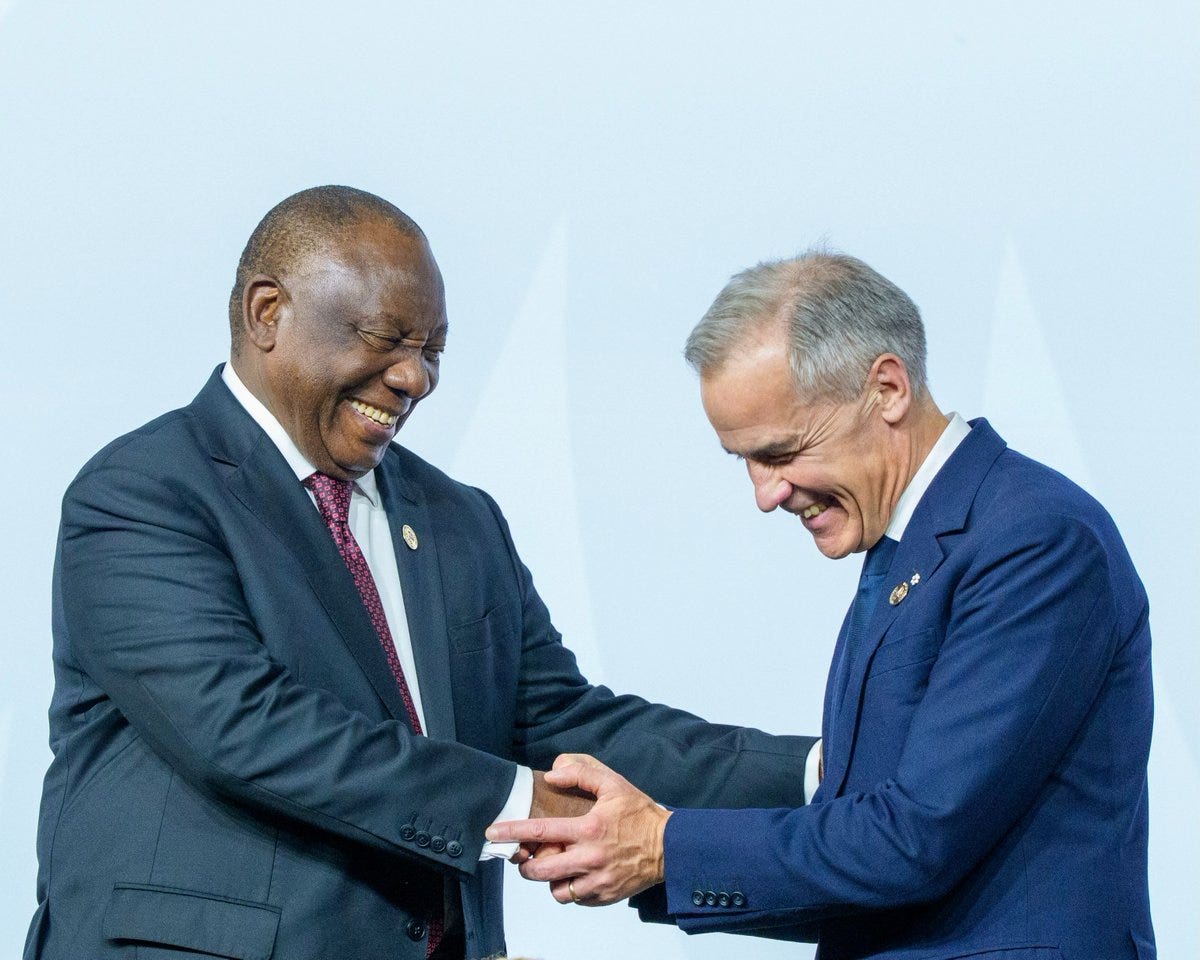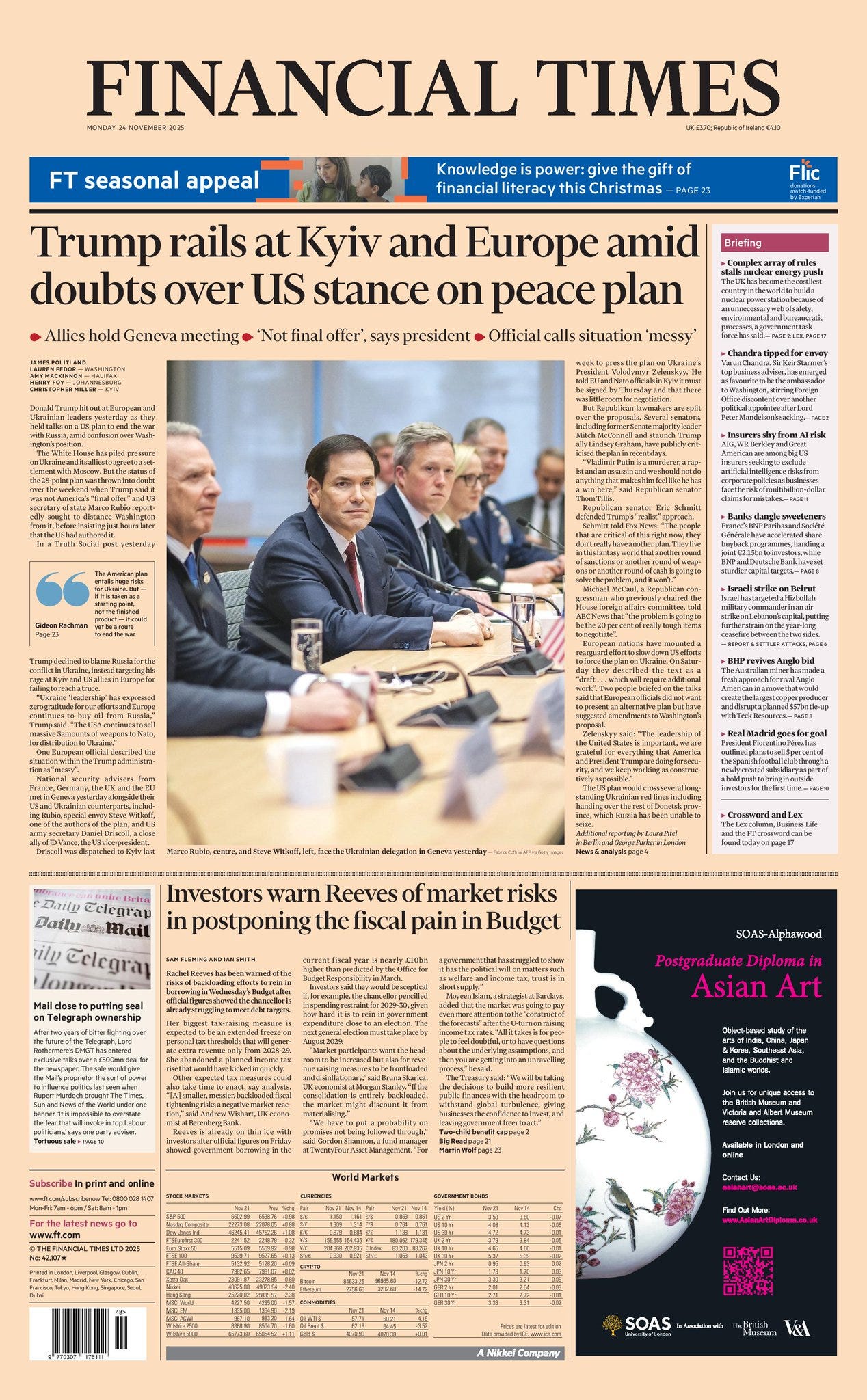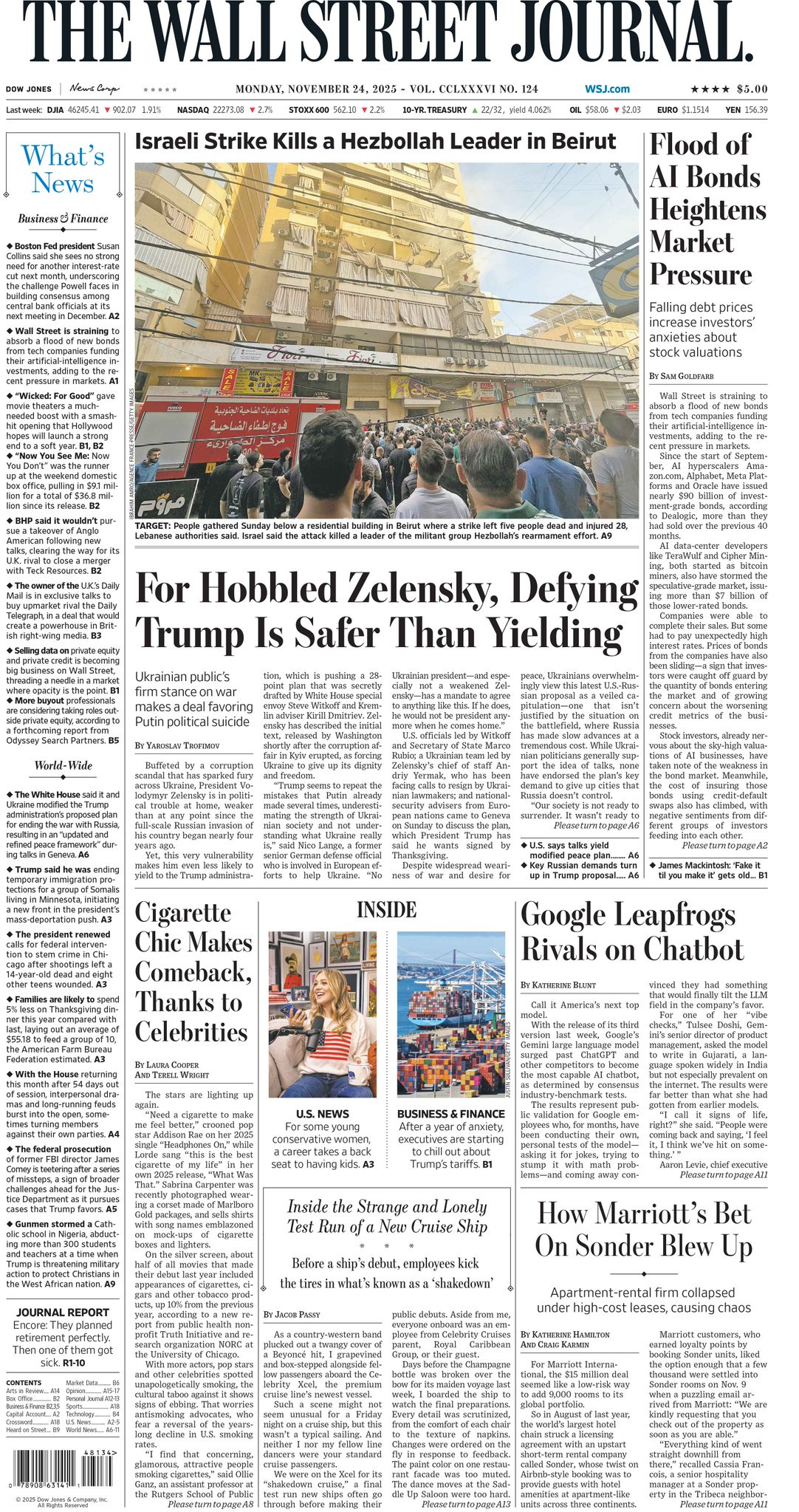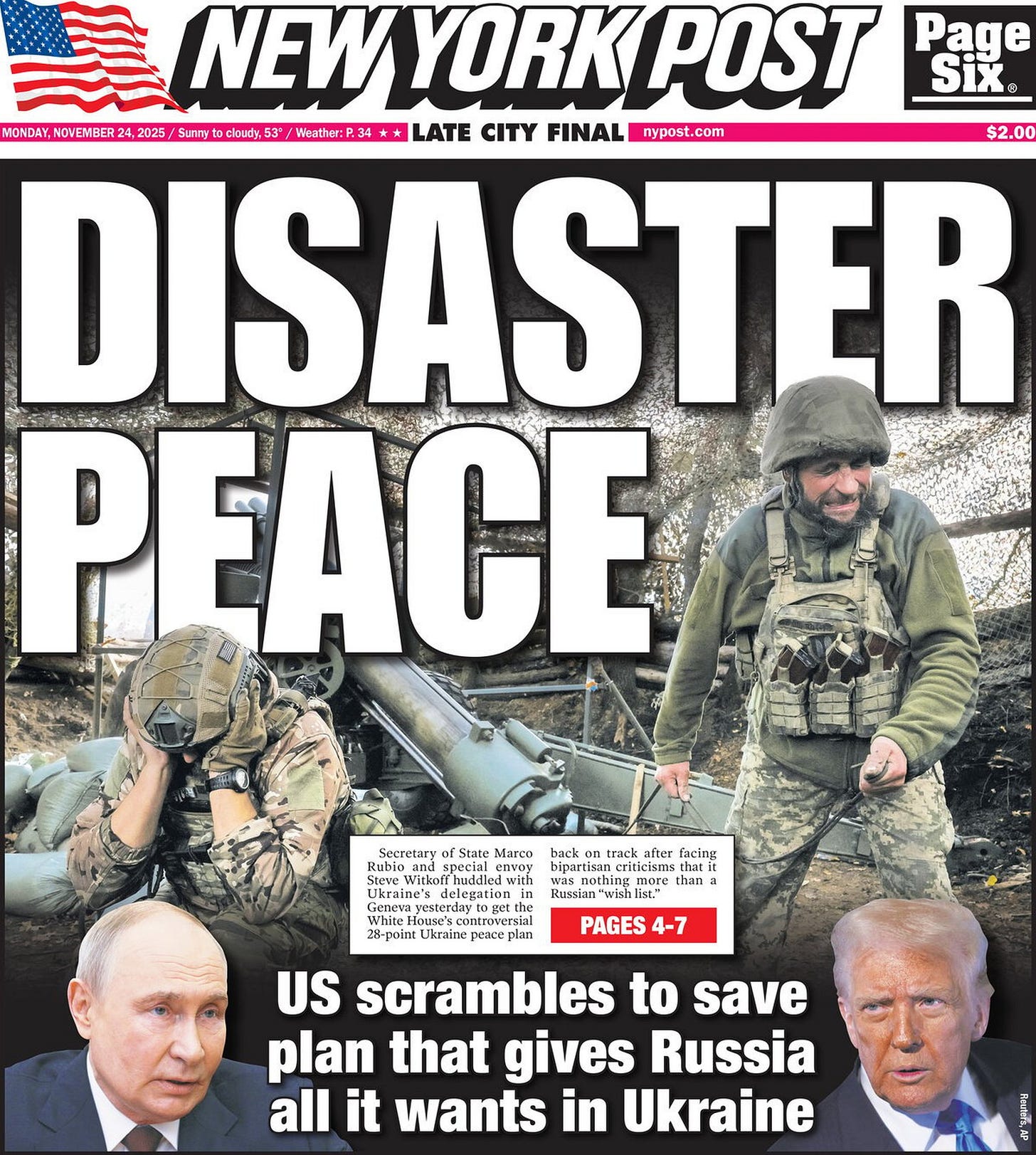Post-G20 Hangover: A Moscow-Tilted Peace Plan Tightens Its Grip, as Ukraine Fights for Survival
Zelensky warns that recognizing occupied territories is the fatal red line - yet Trump’s blueprint, with its land concessions and cuts to Ukraine’s military, may still end up ruling the day

Ukraine’s President Volodymyr Zelensky has welcomed “important steps” made during peace talks with the US in Geneva - but warned the “main problem” remained Vladimir Putin’s demand for legal recognition of Russian-occupied territories in eastern Ukraine. After US and Ukrainian officials convened in Switzerland on Sunday to discuss ending the war with Russia, officials from both sides reported “progress” and an intention to continue working. However, no details have emerged on how to bridge the considerable divide between Moscow and Kyiv over territorial issues and security guarantees for Ukraine. It is now thought that Zelensky and US President Donald Trump will meet to discuss the more contentious points, although no timeline has been given. Following the end of the talks in Geneva Trump suggested on social media that “something good just may be happening”, but with the caveat: “Don’t believe it until you see it.” Russian representatives did not take part in the meeting in Switzerland and the Kremlin said it hadn’t received any information on the outcome of the discussions. Spokesman Dmitry Peskov noted Moscow was aware that “adjustments” were made to the plan that had initially been welcomed by Putin. That 28-point peace proposal was drafted by US and Russian officials in October and presented to Ukraine last week. Several of its elements seemed heavily geared towards Moscow’s longstanding demands, sparking consternation in Kyiv and its European allies - BBC
A senior adviser to Russian President Vladimir Putin scoffed at Europe’s plan to end the war in Ukraine and said the Kremlin preferred U.S. President Donald Trump’s original proposal. Yuri Ushakov, a veteran foreign policy aide to the Russian leader, told reporters in Moscow that the EU’s peace plan, launched in response to the 28-point plan presented by Washington, “constructively doesn’t fit us at all.” Ushakov added that Trump’s plan, which included several major concessions to Russia, including ceding vast swathes of Ukrainian territory and capping the size of Kyiv’s military, was more “acceptable” to the Kremlin.
A dizzying weekend of bipartisan confusion about a White House push to end Russia’s war with Ukraine is hardening interest among Republicans and Democrats alike in passing crippling secondary sanctions on Vladimir Putin.
“I strongly support imposing tough, targeted sanctions on Russia to weaken Putin’s war machine and strengthen America’s hand at the negotiating table,” said Senate Banking Committee Chair Tim Scott, R-S.C., this weekend. He expressed a desire to put “pressure on the Kremlin and give President Trump maximum leverage to secure peace.” Congress has little role in the high-stakes talks in Geneva between US, Ukrainian, and European negotiators. Those could produce a handshake by Thanksgiving, as President Donald Trump hopes – or sink back into the morass of a war that’s approaching its fourth year. Sanctions advocates have pressed Trump to support harsher penalties on Russia since April.
Lawmakers’ ability to clarify their course of action on Russia remains muddled by multiple factors, including whether Trump will support a move aimed at raising pressure on the Russian president. An equal but secondary concern when it comes to teeing up a sanctions vote: Whether and when the Senate is willing to grind through the objections of Sen. Rand Paul, R-Ky. - Semafor
Following up on a statement he made at the G20 leaders summit in Johannesburg yesterday, Turkish President Recep Tayyip Erdoğan spoke to Mr. Putin by phone about the plan on Monday. According to the Kremlin, he said that Trump’s first proposal was a “good base for the future deal.” “Vladimir Putin noted that these proposals, in the version we have seen, are in line with the discussions at the Russian-American summit in Alaska and, in principle, can be the basis of a final peaceful settlement,” the Kremlin said. Erdoğan told reporters in South Africa that the call to Putin follows his meeting with Zelensky recently and that, aside from discussing the war in Ukraine he would raise bilateral issues, such as transport corridors.
In my latest interview with BBC Television News America, I take viewers inside the real, unvarnished dynamics of the G20 here in Johannesburg—at a moment when global power feels unusually fluid. Beneath the staged summit photos, you sense leaders from every corner of the world—G20 members and invited states alike—trying to regain balance in a reordered, disorganized world shaped by Donald Trump’s erratic diplomacy, his tariff threats, and a peace proposal for Ukraine that tilts unmistakably toward Moscow. European and Ukrainian allies are huddling—sometimes in corridors, sometimes in hastily arranged bilaterals—searching for a coherent response to a plan they had no hand in drafting. And for the first time in years, there is a palpable willingness among leaders big and small to stand up to Trump’s bullying tactics. The summit’s absentees have also created unexpected openings. India’s Narendra Modi, sidelined at a previous BRICS gathering, is suddenly centre-stage, while South Africa’s deft management of the Trump boycott and the summit process highlights a country stepping confidently into global leadership. All of this plays out against a broader backdrop: Africa’s rise, with South Africa, Kenya, and others benefitting from favourable demographics and expanding geopolitical relevance—an instructive contrast to the demographic and political malaise gripping Canada, the UK, and much of the West. A revealing look at a G20 in flux—and a global order trying to reassemble itself in real time.
An Israeli air strike killed a senior Hezbollah leader in Beirut, further weakening an already uneasy truce. Israel and Hezbollah agreed to a ceasefire a year ago, but Israel — which says the group has been rebuilding its armories, and that Lebanon is failing in its commitment to disarm it — has ramped up attacks against Hezbollah in recent days. Israel’s ceasefire in Gaza is also shaky: At least 22 Palestinians were killed in strikes on the enclave last week, Hamas-affiliated officials said, in response to what Israel said was an “armed terrorist” attacking soldiers. Gazan authorities say Israeli forces have violated the seven-week truce nearly 500 times, though Washington, which brokered both deals, insists the Gaza pact remains solid.
I invite you to enjoy this short conversation with Roberta Akanyang from Botswana — a sharp, committed voice for impactful journalism, radio host, and keen foreign-affairs observer. We crossed paths here at the G20 Leaders’ Summit in Johannesburg, where I was struck by her dedication: she self-funded her trip to South Africa to bring her trained, independent eye to the proceedings and official statements. Botswana, like dozens of other UN member states, is too often overlooked by mainstream media - which makes journalists like Roberta all the more essential. (A deserved bow to HUMNEWS for consistently giving these voices the platform they merit.)




